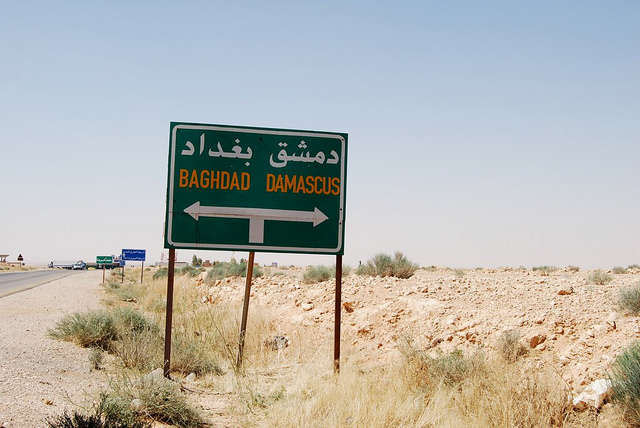 Surprise, surprise! The US has asked Australia to bomb ISIS targets in Syria. The Australian government is to give this request deep reflection and consideration, and will respond in a couple of weeks. And surprise, surprise! The RAAF will begin delivering ordnance on ISIS targets in Syria in the second half of September.
Surprise, surprise! The US has asked Australia to bomb ISIS targets in Syria. The Australian government is to give this request deep reflection and consideration, and will respond in a couple of weeks. And surprise, surprise! The RAAF will begin delivering ordnance on ISIS targets in Syria in the second half of September.
But there is nothing ho hum about the US request, or the inevitability of Australia’s compliance. Like the Howard government’s original decision to commit the ADF to the Iraq war in 2003, based as it was on fabricated intelligence and woeful strategic advice, and the decisions of the Rudd and Gillard governments to stay involved in what has turned out to be a strategic disaster for the US and its partners, the Abbott government seems again destined to make the wrong decision for the wrong reason.
The defining issues in present-day Iraq are neither moral nor legal. Prime Minister Abbott was right to say, as he did a year ago, that a failure to act was both morally unconscionable and strategically dangerous. And while the legal aspects of bombing Syrian territory today are considerably more ambiguous, there is at least an argument that Iraq is under attack from Syrian territory, and that self-defence principles are in play. But these are second order issues. The question is: what kind of action should the US and allies embark upon to restore stability in Iraq and more broadly in the Middle East, not whether bombing ISIS is a moral imperative and whether bombing them in Syria is legal.
Quite simply, the present engagement in Iraq, and potentially Syria, lacks any overarching strategy. ISIS can’t be defeated from the air, regardless of the number of airstrikes, the amount of ordnance dropped or the billions of dollars spent. And even less can ISIS be defeated when the Iraqi army is both unwilling and unable to conduct successful land operations. That is, of course, unless the US and its allies are willing to commit a major land force to the defeat of ISIS—something that public opinion in any of the involved polities is unlikely to support.
Air power is a major force multiplier in conflicts between states, and in conflicts where political outcomes can be delivered by overwhelming armed force. But the US and its partners are not defending Iraq against an external attacker, as they defended Kuwait against Iraq in 2001. Rather, they are involved in a significantly more difficult task—the suppression of a civil war in Iraq.
And at the risk of stating the obvious—though sometimes the obvious is overlooked when the strategic blinkers are on—the fractured and sectarian politics of Iraq are ultimately amenable to a political solution, not a military one. This has been the elephant in the room throughout the entire US and allied engagement in Iraq.
Civil war is the new contagion in the Middle East, extending from Libya to Syria. The dewy-eyed optimists who thought that the so-called “Arab Spring” was the dawn of an age of enlightened and secular government in the Middle East have instead seen the ethnic and sectarian genies escape the bottle. These forces have been building for the best part of a century, when the collapse of the Ottoman Empire enticed Britain and France into a ‘big hands on little maps’ division of centres of influence that has served only to add new complexities to societies and nations already deeply divided.
The ethnic and sectarian fault lines are as extensive as they are deep. While race and religious affiliation provide powerful rallying points for the combatants, the political drivers are inexorable: poverty, economic exploitation and inequality, inequitable wealth distribution, youth alienation and dispossession, historical enmities, political and religious oppression (to identify just a few)—all distilled through filters of anti-Western sentiment and religious fundamentalism.
This cannot be remedied by bombing. Bombing may provide action-men with the satisfaction of doing something rather than nothing, but it’s like putting a Band-Aid on an Ebola victim. It might look handy, but it does not tackle the problem.
Strategy is always about ends and means. As ends, defeating ISIS, no matter how repugnant its terrorist pathology, isn’t the same as ending a congeries of civil wars. Nor is enlisting the support of the Kurds and other allies of convenience the same as re-building Iraq’s (and eventually Syria’s) institutions across the board—political, economic, legal and military.
Because the success of ISIS hitherto is symptomatic of a far more pernicious problem in the Middle East, the US and its allies can’t resolve the problem by means of partial measures. There are really only two options: go the whole hog, and commit ground forces; or address the appalling suffering of Iraq’s and Syria’s citizens through a concerted UN effort involving both the peacekeeping and humanitarian agencies.
Of course, the transition from the bombing option to the negotiation option won’t be easy, and may well involve the continued use of moderated armed force to sanction recalcitrance. As Europe learned in 1648 when the belligerent parties negotiated the Treaty of Westphalia to end the Thirty Years War, at some point the fighting has to stop.
And those who think that Russia will veto such an approach should think again. Diplomacy is about defining issues correctly, identifying shared objectives, and finding solutions that engage the interests and the energies of all parties. No one is being served by the status quo, and that includes Russia. Let’s try diplomacy for a change.
But while we continue to apply a largely tokenistic military solution to the consequences of political ferment—all without an overarching and inclusive strategy—all we shall get for our efforts is the sound of one hand clapping.

